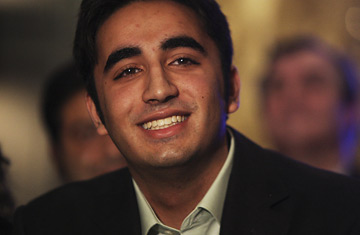
Bhutto Zardari, the son of Benazir Bhutto, speaks during a news conference at a hotel in London, Tuesday Jan. 8
Accompanied by men more than twice his age, Bilawal Bhutto Zardari sat through his introduction with the downward gaze of a sullen teenager. But when it came time to speak, he looked up with the same large brown eyes that from underneath her headscarf helped make his mother famous, and which now seem to reflect the gaze of the world.
"This is a new experience for me, and I'm a bit nervous," he said.
So began the political career of the 19-year-old chairman of Pakistan's main opposition party, the Pakistan Peoples Party (PPP). In his first full press conference since the Dec. 27 assassination of his mother, Benazir Bhutto, Bhutto Zardari laid out his plan to finish his three-year history degree at Christ Church College, Oxford and then enter politics, asserting that his lineage makes him a natural future leader of Pakistan.
But what was clear, both in Bhutto Zardari's words and unsure delivery, is that this would-be savior of a Muslim nuclear state on the verge of disintegration is exactly what he appears to be: a teenager nowhere near ready to lead a student union, let alone a country. "Unless I can finish my education and develop enough maturity, I recognize that I will never be in a position to have sufficient wisdom to enter the political arena," Bhutto Zardari himself conceded.
In a crammed and overheated hotel basement, the painful contradictions of Bhutto Zardari's appointment to the chairmanship of the PPP were laid bare: here was a young man dealing with a country plagued by poverty from a boutique hotel in Kensington on behalf of a party claiming to push for democracy even as it consolidates a dynasty. The British press pack was relentless. One BBC journalist asked: "What on earth do you propose as a 19-year-old who has hardly lived in the country, what do you propose you can offer Pakistan, a country of 170 million people?"
Bhutto Zardari replied: "It is true that I haven't lived there, but I was raised by my mother, I was completely and utterly involved in everything she did."
The BBC reporter fired back: "What does it say about a party that it can be handed on like some piece of family furniture?"
"They asked me to do it," Bhutto Zardari countered, in a reference to his appointment by the party's central committee. "They represented the whole federation and they asked me to do this."
The press conference took place on a date originally scheduled for Pakistan's general election, which has now been delayed for six weeks following Bhutto's assassination. Accusing Pakistani President Pervez Musharraf of a cover-up, Bhutto Zardari called for a United Nations-led investigation into his mother's death, claiming that the current team of British investigators does not have "the necessary transparency." In perhaps his most composed moment, he answered a question about how the United States should conduct its policy toward Pakistan, saying "Dictatorships feed extremism and once the United States stops supporting dictators we can tackle the extremism problem."
Before Bhutto Zardari is even old enough to run for office (he must be 25, according to Pakistani law), the country faces an ongoing political crisis. Opposition politicians have accused Musharraf of delaying the election in an attempt to avoid a wave of sympathy votes for the PPP that might hurt the incumbent Pakistan Muslim League-Quaid-e-Azam, which supports Musharraf. And while relative order has been restored to the Pakistan streets since protests rocked much of the country following Bhutto's death, a deep uncertainty surrounds the upcoming elections. All the while, lawlessness and the accompanying influence of Islamic fundamentalists continue to spread in the Northern provinces.
Repeatedly during the press conference, when pushed about the legitimacy of becoming the titular head of the PPP, Bhutto Zardari returned to an apocalyptic theme. "There was a moment of crisis," he said of his appointment. "Pakistan was burning. We needed to show a united front."
There is certainly a myth in many cultures of the golden child, the young man who emerges from a period of uncertainty to lead his people to salvation. But in Pakistan, a land already ravaged by competing myths of religion and tribalism, it is clear that what this 19-year-old neophyte needs most is not another fable but a thorough initiation into realpolitik. In a crowded London hotel room today, he received his first lesson.
